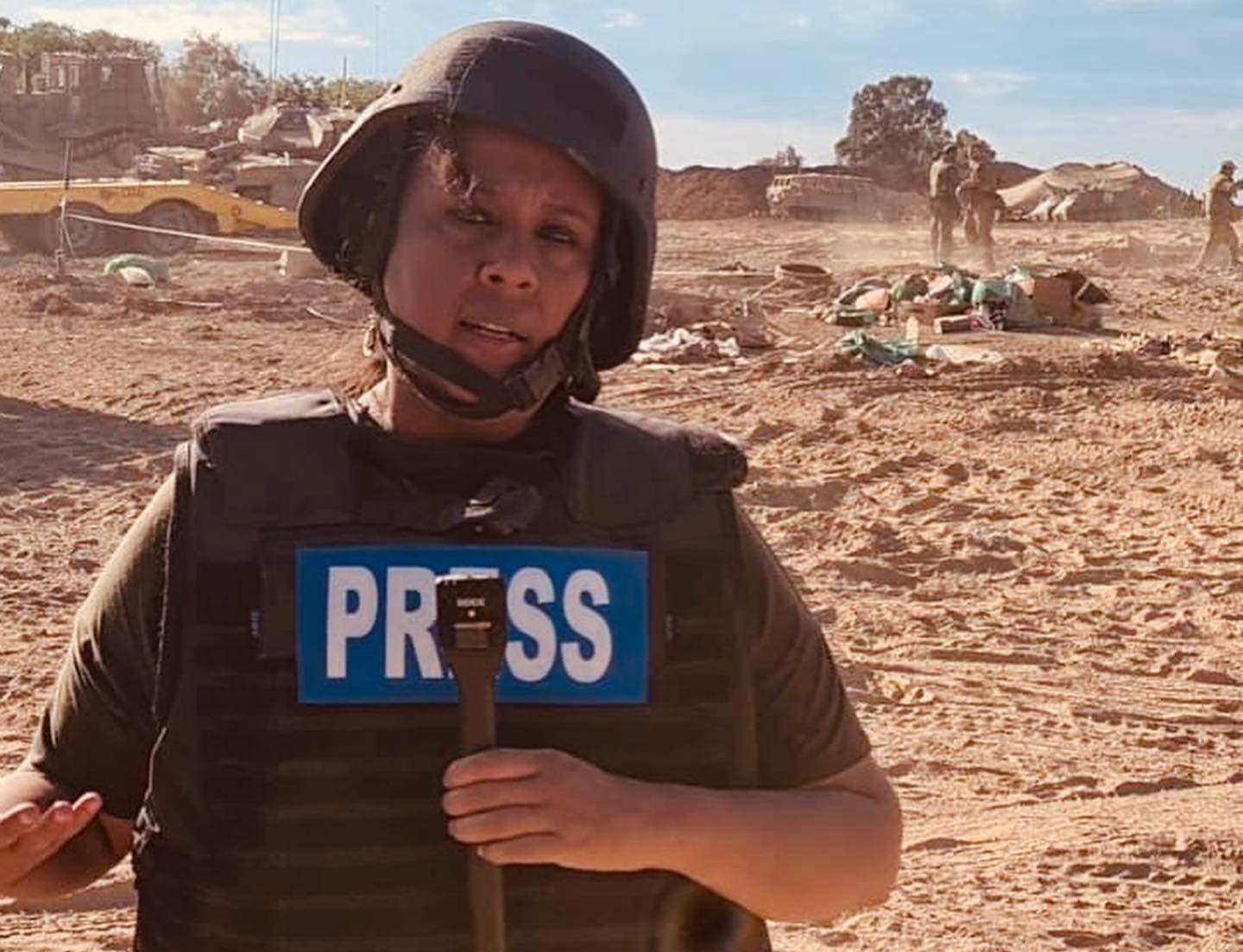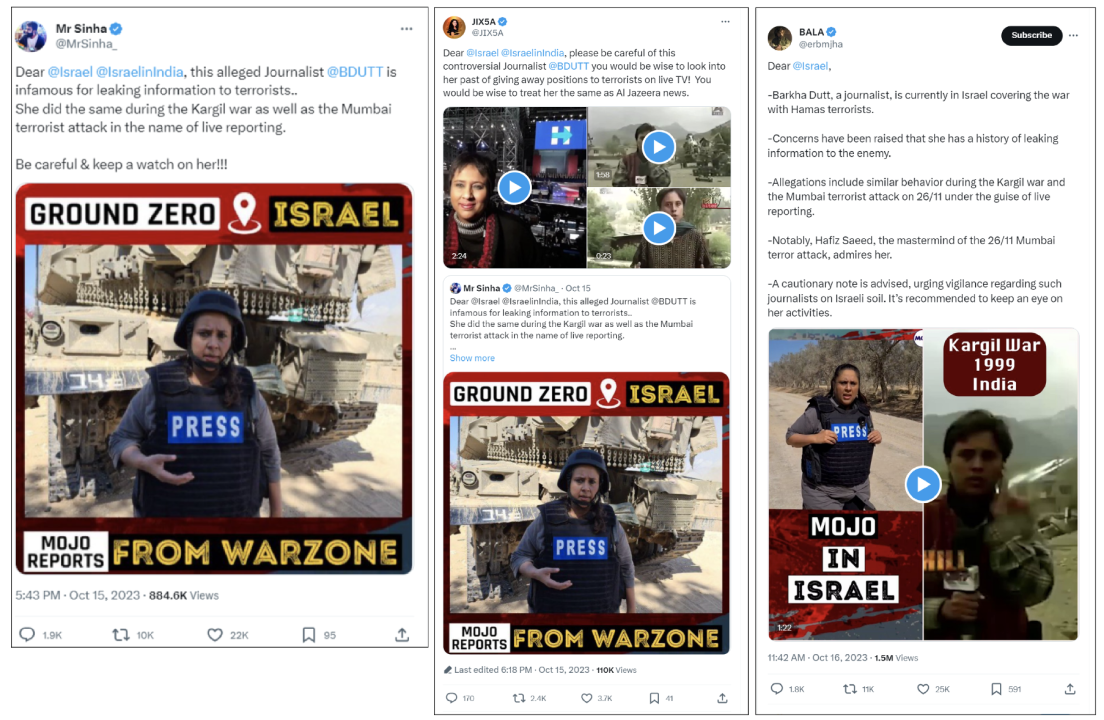Indian Twitter accounts exploit Mideast conflict to attack journalist
Accounts potentially coordinated to portray journalist Barkha Dutt as a security threat to Israel and urged action against her
Indian Twitter accounts exploit Mideast conflict to attack journalist

Banner: Indian journalist Barkha Dutt reporting from Israel, October 19, 2023. (Source: @BarkhaDutt/archive)
An online campaign showing indicators of coordination targeted Indian journalist Barkha Dutt of Mojo Story on X as she covered the ongoing Mideast conflict while reporting from Israel in October 2023. A group of Indian accounts published identical or highly similar tweets that specifically targeted Dutt, who has more than seven million followers on X, claiming that she posed a security threat to Israel. The accounts seemed intent on alerting Israel by tagging official Israeli government accounts and individual officials to warn them about Dutt, often calling for her deportation and sometimes encouraging violence against her.
Journalists and media covering the conflict have faced extremely difficult challenges, particularly those reporting from inside the besieged Gaza Strip. On December 5, 2023, the Committee to Protect Journalists reported that it had documented more than sixty journalists killed since the conflict began on October 7.
In India, where the targeting of independent news organizations continues to increase, Amnesty International highlighted that women journalists in particular “face a growing backlash on social media that has included rape and death threats.”
Based in Delhi, Barkha Dutt is an award-winning journalist who has reported from many conflict zones across the world. She previously worked for India’s NDTV before founding and working for Mojo Story. The veteran journalist has been critical of Prime Minister Narendra Modi and the ruling Bharatiya Janata Party, and previously claimed she had been blacklisted by the government. She has also faced legal harassment, online sexual harassment, threats of violence, and other threats against her.
Dutt has also experienced specific criticism in the past for her reporting during the 1999 Kargil war between India and Pakistan and the 2008 Mumbai terrorist attacks. Critics alleged that her reporting may have revealed military details and compromised security operations.
Following tweets she posted on October 15, 2023 about her on-the-ground reporting in Israel, Indian accounts began spreading a narrative claiming that Dutt could leak important information during the war that could harm Israel. These tweets adopted a similar text format in which the accounts tagged official accounts in Israel and used similar text to make specific allegations against her.
Similar tweets targeting Dutt garnered significant engagement
Many of the posts attacking Dutt came in response to highly similar tweets which received significant engagement. Specifically, three tweets from the accounts @MrSinha_, @JIX5A, and @erbmjha attacking the journalist collectively garnered over 2.4 million views and thousands of likes, retweets, and other forms of engagements. The three accounts started their tweets by tagging official Israeli accounts to draw their attention, and encouraging the Israeli government be wary of Dutt and her reporting. The accounts contained similar warnings such as “please be careful,” “be careful,” and “a cautionary note is advised,” as well as “look into her,” “keep an eye on her,” and “keep watch on her.” They also made similar references to her reporting of the Kargil war and the 2008 Mumbai attack.

Many other accounts spread the same message using a similar format, starting their posts with the phrase “Dear @Israel” – Israel’s primary public diplomacy account on the platform – followed by additional official accounts such as Prime Minister Benjamin Netanyahu, former prime minister Naftali Bennett, the Israel Defense Forces, the Office of the Prime Minister, the Foreign Ministry, and the Ministry of Defense. Accounts also often mentioned the official accounts of the Israeli embassy in India and the Indian ambassador to Israel. The main message these posts had in common was to urge Israel to stay “alert” regarding Dutt, with some of them also encouraging the government take action against her by claiming she might leak important tactical information.
For instance, on October 16, the accounts @GSaggar, @AgyaatLog, and @SouravShuklaJi published almost identical text attacking Dutt. All three accounts started the tweet by tagging multiple official Israeli accounts, then accused Dutt of being an “alleged journalist” known for “leaking information to terrorists.” All three accounts used the same picture of Dutt reporting from Israel for Mojo Reports.

In another example, X accounts @NTR1008 and @H___U___L___K shared identical tweets, both mentioning the same Israeli official accounts. The first tweet, from @NTR1008, was a reply to an unrelated tweet by the @Israel account, while @H___U___L___K’s tweet was the same text posted more than an hour later as an original post. Both contained verbatim text, including the capitalization of the word “Journalist” and the use of only two dots as an ellipsis:
Dear @Israel @IsraelinIndia, this alleged Journalist @BDUTT is infamous for leaking information to terrorists.. She did the same during the Kargil war as well as the Mumbai terrorist attack in the name of live reporting.
Be careful & keep a watch on her!!!

Accounts also spread similar messages using the same format to Dutt’s account by quote retweeting one of her posts from Israel. The DFRLab noted at least ten quote retweets to one of her tweets that attacked her.
Among the tweets reviewed by the DFRLab, our analysis uncovered six posts requesting that Israeli authorities kill Dutt. For example, one post in Hindi encouraged Israeli authorities to “shoot” her, claiming such action was warranted by alleging without evidence that Dutt is affiliated with Hamas. The DFRLab has chosen not to include links to these tweets, which appear to violate X’s violent speech policy that prohibits inciting, promoting, or encouraging others “to commit acts of violence or harm.”
The DFRLab also noted a number of accounts targeting Dutt also featured a blue “I stand with Israel” avatar that is widely popular among mainstream supporters of Israel around the world. Among these were a handful that also advocated for the complete destruction of Gaza or Palestine more broadly, but these were not representative of most of the accounts featuring the blue avatar.

An additional eleven accounts used the same digital image of Indian national flag for their avatars.

Though the accounts demonstrated similar views and activities, it is still difficult to determine their authenticity. Many had maintained certain levels of ambiguity, while others used pictures of possibly real users. Yet questions about their authenticity do not rule out the possibility of coordination, however.
Dutt, meanwhile, continues to write about the conflict. In an October 27 commentary for the Hindustan Times, she expressed support for India’s official position about the war. “The Indian position, an unequivocal calling out of terrorism but a firm underscoring of the rights of the Palestinian people, is probably the most granular and textured response in the world today,” she wrote. “More countries, and more commentators, need to take the same position. Civilian lives, on both sides, are at the heart of the matter. Agreeing on this fundamental fact may make global intervention more effective – and honest.”
Cite this case study:
“Indian Twitter accounts exploit Mideast conflict to attack journalist,” Digital Forensic Research Lab (DFRLab), December 5, 2023, https://dfrlab.org/2023/12/05/indian-twitter-accounts-exploit-mideast-conflict-to-attack-journalist.

